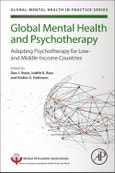Global Mental Health and Psychotherapy: Adapting Psychotherapy for Low- and Middle-Income Countries takes a detailed look at how psychotherapies can be adapted and implemented in low- and middle-income countries, while also illuminating the challenges and how to overcome them. The book addresses the conceptual framework underlying global mental health and psychotherapy, focusing on the importance of task-shifting, a common-elements approach, rigorous supervision, and the scaling up of psychotherapies. Specific psychotherapies, such as cognitive-behavioral therapy, interpersonal therapy and collaborative care are given in-depth coverage, as is working with special populations, such as children and adolescents, pregnant women, refugees, and the elderly.
In addition, treatment strategies for common disorders, such as depression, anxiety and stress, and substance abuse are covered, as are strategies for more severe mental disorders, such as schizophrenia.
Please Note: This is an On Demand product, delivery may take up to 11 working days after payment has been received.
Table of Contents
Introduction Rethinking Psychotherapy
Section 1: Conceptual Issues 1. Global mental health and psychotherapy: Importance of task-shifting and a systematic approach to adaptation 2. Transdiagnostic therapeutic approaches: A global perspective 3. Training and Supervision in global mental health and psychotherapy 4. Scaling up and implementing psychotherapies in low-resource settings
Section 2: Globalizing Psychotherapies 5. Cognitive-behavioural therapy around the globe 6. Emerging models of psychotherapy 7. Collaborative Care Models: A global perspective
Section 3: Clinical Disorders 8. Psychotherapy for depression and anxiety in low- and middle-income countries 9. Psychotherapy for PTSD and Stress Disorders 10. Psychotherapy for Schizophrenia and Bipolar Disorder 11. Psychotherapy for Substance Use Disorders
Section 4: Clinical Populations 12. Chronic Physical Diseases 13. Psychotherapy adaptation for children and adolescents 14. Psychotherapy for psychiatric disorders during pregnancy 15. Psychotherapy adaptation in aging populations 16. Refugees and Migrants








